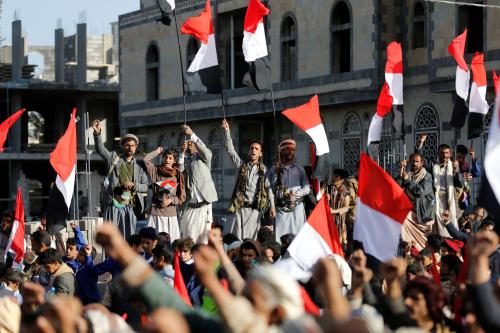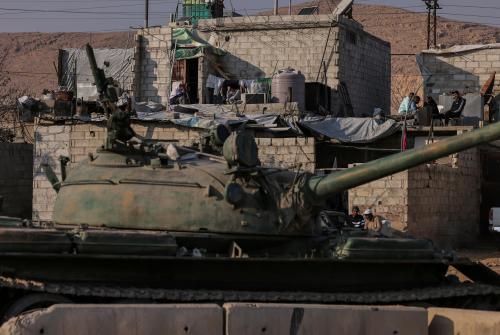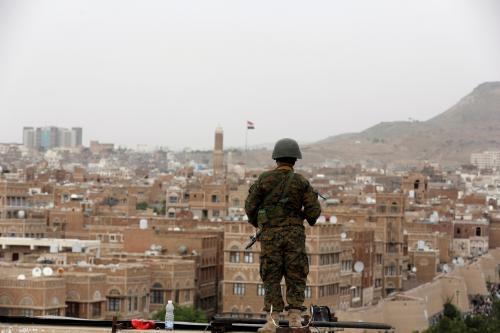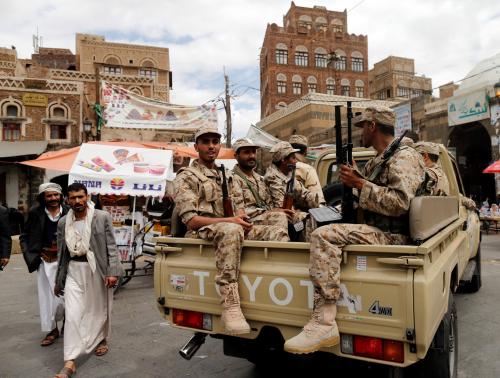The war in Yemen is approaching a catastrophic battle for control of the crucial port of Hodeidah. Washington is tepidly counseling the Saudi- and Emirati-led coalition to refrain from trying to capture the strategic port, but it is far from clear that they will listen. The administration has sent mixed signals to Riyadh and Abu Dhabi.
Hodeidah is the major port of northern Yemen. Approximately 70 to 80 percent of the nation’s vital imports of food and medicine arrive via Hodeidah. The Zaydi Shia Houthis have controlled the strategic port city of a half million people since 2014. It is a major source of revenue for the rebels and a historic smuggling entrepôt. The city is primarily comprised of Sunnis. It is a very humid and hot place, average daily high temperatures in the summer are over 100 degrees Fahrenheit.
The Emirates have organized a loose coalition of Yemeni groups—some loyal to President Abdo Mansour al Hadi, others loyal to former President Ali Abdullah Saleh, and some advocates of South Yemeni secessionists—to assault Hodeidah. Backed by Saudi and Emirati air power, they have pushed north along the coast from southern Yemen gradually and are now only a few miles from the city. The fighting is getting intense as it approaches the city.
The United Nations says a battle for Hodeidah will stop the supply of food and medicine to the majority of Yemenis. Over 20 million are already in need of assistance, and seven million are at severe risk of malnutrition. The U.N. and the Red Cross pulled their employees out of Hodeidah this week, citing the dangers. An urban battle, typical of the fighting in the more than three years old war, could drag on for weeks or months and devastate the city. The U.N. has proposed the Houthis turn it over to some kind of neutral international regime to allow humanitarian assistance, but the Houthis are very suspicious that the U.N. is beholden to the Saudis and their allies. The U.N. has been very reticent to criticize flagrant human rights violations by the Saudi coalition.
The United States has backed the Saudis since the war began. President Barack Obama was preoccupied with the Iran nuclear deal, and did not want to further damage the relationship with the Saudi palace. The Royal Saudi Air Force is wholly dependent on American and British support for its maintenance and operations. The Trump administration has quietly increased support for the coalition’s war effort, especially in reaction to the Houthis missile attacks on Saudi cities. The Houthis have hit Riyadh with these missiles and have promised that Abu Dhabi is next. Iran and Hezbollah provide the technology and expertise for the Houthis missile capabilities.
Last December, the Trump administration was successful in persuading the Saudis and Emiratis to stand down from assaulting Hodeidah, citing the humanitarian risk. This week, Secretary of State Mike Pompeo has again urged restraint while stressing American support for the Saudi security concerns. There are increasing critics of the war in Congress, urging a cut-off in U.S. arms support and intelligence assistance if the port is attacked, but they have consistently fallen short of the votes needed to stop aid.
Moreover the administration’s strong opposition to Iran, highlighted by its violation of the Joint Comprehensive Plan of Action, has encouraged the Saudis to believe that they will not face serious opposition from Washington. Crown Prince Muhammad bin Salman (MBS), the architect of the war whose reputation is dependent upon the outcome, has extensive backchannel connections to the White House. Demarches from Pompeo and his predecessor to halt the blockade of Qatar have been ignored by Riyadh at no cost. Trump’s visit to Saudi Arabia last year and MBS’s visit to the United States this spring—when many touted him as a reformer—has given the Saudis the impression that America does not care about Yemen.
A serious attempt to end the war will require a concerted effort by Washington and key Western capitals—including London, Paris, and Ottawa (all major arms suppliers)—to challenge the Saudi coalition and Iran. The collapse of the G-7 summit in Quebec makes that highly unlikely.
Outside pressure is unlikely to avert the looming disaster. But even if the Houthis lose Hodeidah, the war will go on. The Houthis have been fighting the Saudis off and on for over a decade. They are good at it.
The Brookings Institution is committed to quality, independence, and impact.
We are supported by a diverse array of funders. In line with our values and policies, each Brookings publication represents the sole views of its author(s).






Commentary
In the face of Hodeidah assault, Yemen is on the brink
June 13, 2018